Actively misleading terms undermine public trust
Seriously, just stop it
Before we begin, thank you to the 232 people who completed the Professions of Good and Evil survey - and particularly to all of you who shared it so that it got picked up outside of the core readership. I’ll be analysing the - very interesting! - results over the weekend, but in the meantime a short piece on misleading terms and the impact on public trust.
One contributing factor to decling trust in public institutions is the way government, the media and other major organisations use terms that mean something very different from what they appear to.
I’m not talking about jargon - every profession has jargon - but terms that are actively misleading. Examples are 'life' sentences, ‘mandatory’ prison sentences or 'no recourse to public funds'.
Note, this is not about saying that all people with 'life' sentences should literally be locked up for life, and similarly for the other areas. It's about the fact that if we want people to have trust in what politicians, or ‘establishment’ figures more broadly, say, we should use words clearly, not in ways that actively mislead.
Take life sentences. To anyone not versed in it it sounds like the person is going to go to prison for life. And a lot of people think that sounds reasonable for, say, a murderer. But actually, most murderers serve 11 - 18 years in prison
That's still a pretty hefty sentence! I’m not suggesting everyone currently sentenced to ‘life’ should actually be locked up for their whole life.1
But if you thought someone was being locked up for life, you might be miffed if they get out in 15 years. You might think the Government or media has lied to you.
And you might become more open to listening to people who tell you that they're lying to you.
If you read the gov.uk page on this, it's about as clear as mud. It certainly doesn't make clear that most people get out in less than 20 years
Compare it to the much clearer and more transparent 'Full Fact' explainer. It shows it is possible to explain this clearly and objectively - and the Government page is choosing not to.
Or take knife crime.
The law (Sentencing Act 2020, Section 315) says that someone convicted of knife crime must be imprisoned, unless there are particular circumstances that would make it unjust. This is commonly referred to as a mandatory prison sentence.
But actually, in 1/3 of the cases related to repeated possession of such a weapon, the person wasn't put in prison!
Now, maybe you think that is justified and maybe you don’t - that’s a separate issue. But calling it a mandatory prison sentence is actively misleading.
Or how about 'No recourse to public funds'?
This is a condition applied to some immigrants, such as those on work or study visas, and some others. Sounds like these people, well, don't get any public funding, yes?
But it turns out only some benefits are classed as 'public funds'!
Someone with 'no recourse to public funds' can get statutory maternity and sick pay, incapacity benefit, jobseeker's allowance, free school meals and more. Plus that person can use the NHS, schools, and other public services.
Similarly, the Government and people in the media often say asylum seekers can't claim benefits. But they do receive state support - notably housing. They also receive a small amount of cash: £49.18 a week per person (or £8.86 if accommodation provides meals). Children will often be taken to schools in taxis, at taxpayer expense.
Now, this isn’t about whether or not they should get that money or have access to those services. There will be a range of views on this, and naturally so.
But again, it reduces trust if politicians, commentators and the media say that a group of people have ‘no recourse to public funds’ - when actually several billion pounds of public funds are being spent.
We need more honesty in public life. Jargon is bad enough - it’s not ideal, but every profession and occupation collects jargon.
Actively misleading terms are far worse. It's essentially lying to the public and hoping they won't notice. But the public always notice in the end.2
If you’ve been saying that someone has ‘no recourse to public funds’, and then, when someone points out they do, you’re forced to resort to saying, ‘Well, actually, ‘no recourse to public funds’ is a technical term, and only some public funds are classed as public funds for the purpose of this definition’, then that sounds incredibly shifty. Why should anyone believe you on anything else?
For the radicals on both left and right who want to say, ‘The Government is lying to you’ or ‘You can’t trust the mainstream media’ - you’ve just made their job ten times easier. And who do you think they’ll believe next time they say ‘they’re lying to you’ - even if, that time, they’re the one’s who are lying?
We have do better.
Stop calling 15 year sentences 'life'. Stop referring to ‘mandatory prison sentences’ when fully a third of those convicted don’t go to prison. Stop saying someone has 'no recourse to public funds' and then defining some public funds as 'not public funds'. Stop all the other actively misleading terms that fundamentally undermine trust.
If Government thinks those policies are the right ones - and perhaps they are - then they should have the courage to describe those policies as they are, and openly defend them.
Otherwise it leaves an open goal for those who wish to tear down the system.
If you enjoyed this piece, you may also enjoy, You Cannot Only Sometimes Stand for Truth
For one thing, imprisoning octogenarians tends to have limited utility.
As Abraham Lincoln may perhaps have said, “You can fool all the people some of the time and some of the people all the time, but you cannot fool all the people all the time.”


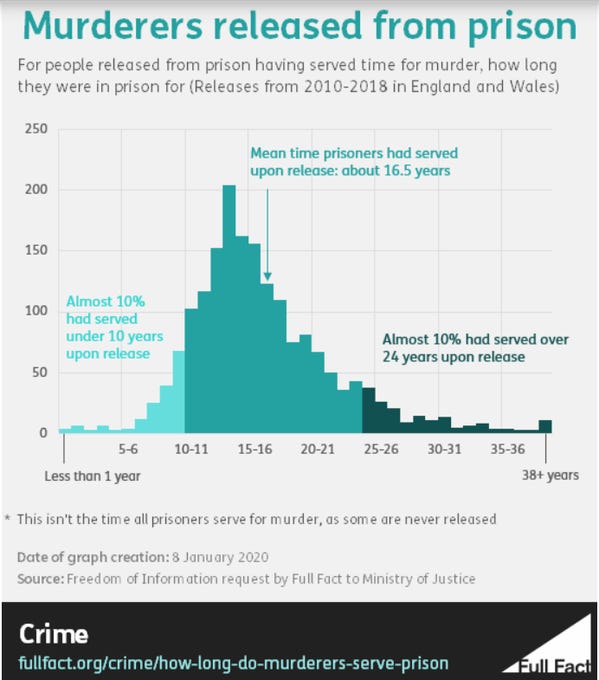
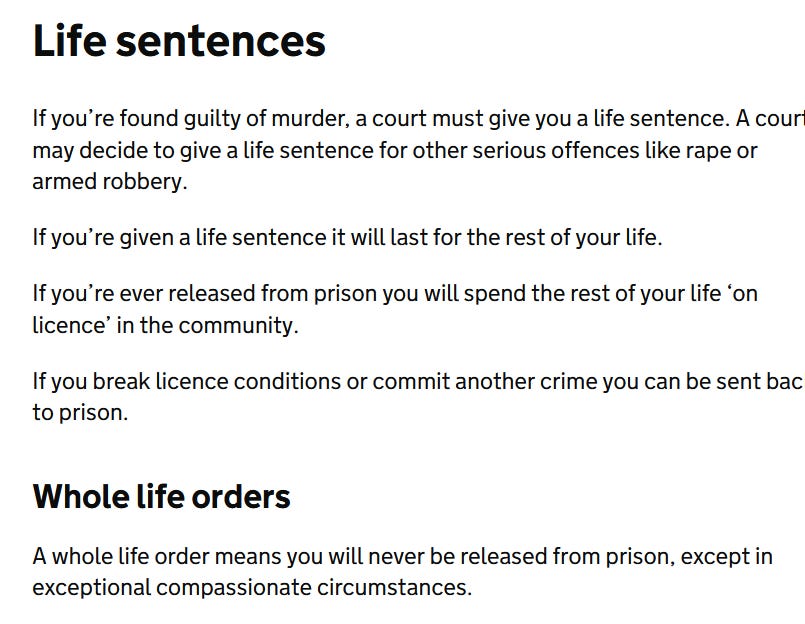
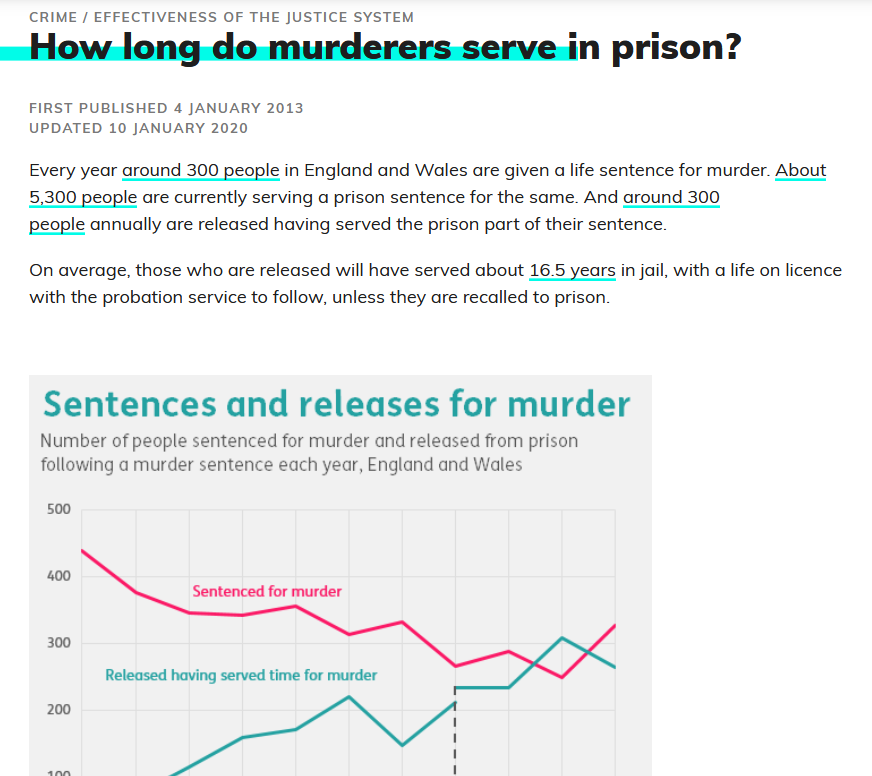
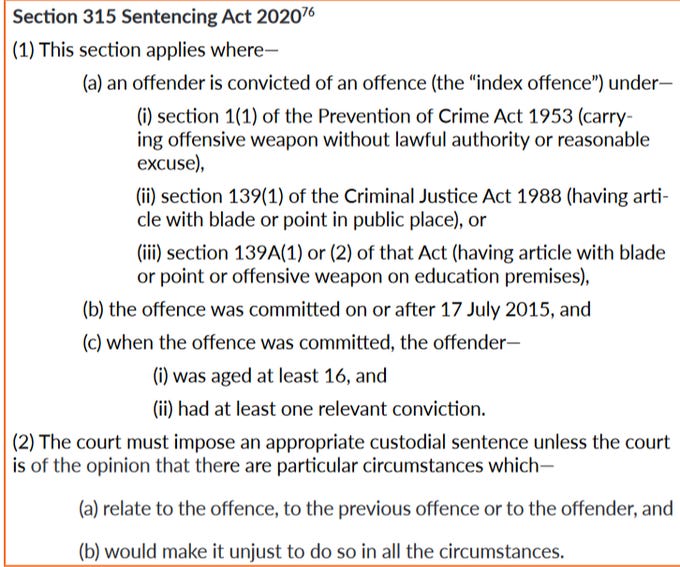
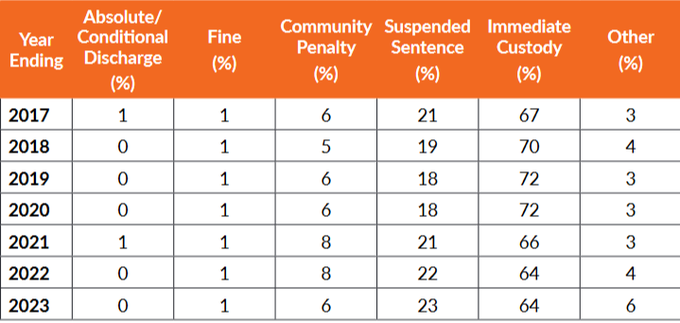
'Homeless' is another example - used by us ordinary folk to mean 'people who don't have a building to sleep in' and defined by officials to mean ... actually it's quite hard to say what officials mean by it. Something like "people who either don't have a permanent place to live or are in the wrong sort of rental, but almost all of whom are in some sort of housing every night." I assume someone thought they could get an advantage from being able to say there were way more homeless people, so they rewrote the definition.
'Suspended sentence' is another that gets my goat. As far as I can tell it means "Not in any sense a sentence. We agreed you committed this crime, but we're letting you get away scott free. The number of years listed after the suspended sentence is just a guide to what you could have won if we'd been doing the 'justice' part of justice system that day."
Saw another one today in https://www.bbc.co.uk/news/articles/clyq3xr9ql5o
"The Welsh government has a goal for Wales to be smoke-free by 2030, meaning a prevalence rate [of smoking] in adults of 5% or less."
Reminds me of how Tic Tacs are "sugar free" even though they're nearly entirely sugar, because a single serving is one Tic Tac and it contains a negligible amount of sugar because it's so small in total.